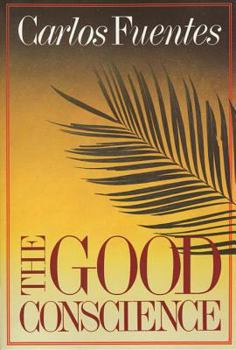The Good Conscience
Select Format
Select Condition 
Book Overview
The Good Conscience is Carlos Fuentes's second novel. The scene is Guanajuato, a provincial capital in Central Mexico, once one of the world's richest mining centers. The Ceballos family has been reinstated to power, and adolescent Jaime Ceballos, its only heir, is torn between the practical reality of his family's life and the idealism of his youth and his Catholic education. His father is a good man but weak; his uncle is powerful, yet...
Format:Paperback
Language:English
ISBN:0374507368
ISBN13:9780374507367
Release Date:March 1987
Publisher:Farrar, Strauss & Giroux-3pl
Length:148 Pages
Weight:0.10 lbs.
Dimensions:0.4" x 5.6" x 8.5"
Customer Reviews
2 ratings
The awakening of consciousness
Published by Thriftbooks.com User , 23 years ago
Las Buenas Conciencias first appeared in 1959, after the resounding success of La Región Más Transparente (1958). For those who were longing to read another Fuentes' frenzied exercise of style, the new book turned out to be quite disappointing. The author tried to justify this "failure" by classifying his work as a cathartic novel, a very simplistic overview for such a complex narrative, where the rich intertextual strata interfere with the apparent linearity of fictional discourse.From Benito Pérez Galdós' main works (Fornunata y Jancinta; Nazarín) Fuentes extracted some human profiles and existential experiences, besides, of course, the critical insight that lingers in spanish realism inheritance. Just as Pérez Galdós, Fuentes focuses his attention on the petit bourgeois evolution, but his Guanajuato is far from the tumultuous and transitionary life of that Madrid painted by the spanish writer in his books. We must say, however, that Fuentes succeeded in adapting Pérez Galdós' conceptions of an individual and a collective unconscious, through which fiction displays the struggle of two enduring forces: the dynamic of personal fantasy and the stagnation of social values that preshape reality.Other intertextual instances contribute to the formation of a new Jaime Ceballos. Rosseau's Confessions, the Mémorial de Sainte Hélene, by Las Cases, some readings that reveal the immanent duality of literature: a powerful tool for denouncement but also a dangerous vehicle of alienation. Jaime "feels" before "thinking", learns how to cultivate high but imaginary sentiments. So did one of his favorite heroes: Julien Sorel, from Le Rouge et le Noir. In despite of the due structural dissimilarities, the reader can easily recognize the many analogies which relate one book to the other. Beyond the mere episodic resemblances, the link that connects these two novels is a disturbing analysis of historical process, by use of moral and psychologic investigation, in order to emphasize - as René Girard points out (Mensonge Romantique et Vérité Romanesque) - the fight of "passion" against "vanity", of "exception" against "norm". Finally, the presence of Goya in this precious, intricate fictional tapestry. The allusion to the Ydioma Universal (Universal Language), frontispiece for the second version of Sueños (1797), summons in Las Buenas Conciencias the same acute criticism that prevails in Goya's works, to whom painting has always been as eloquent as literature. But, since Jaime Ceballos' desperate fight for transformation is set up into a rite of abstract aims, Las Buenas Conciencias must end as it begins: as an anguishing cycle, where only Literature and Art can provide the fictional and real human beings with an extra and truer life.
The Good Conscience
Published by Thriftbooks.com User , 25 years ago
This is an excellent novel written by Carlos Fuentes that describes a struggle between self-integrity and self-interest.






